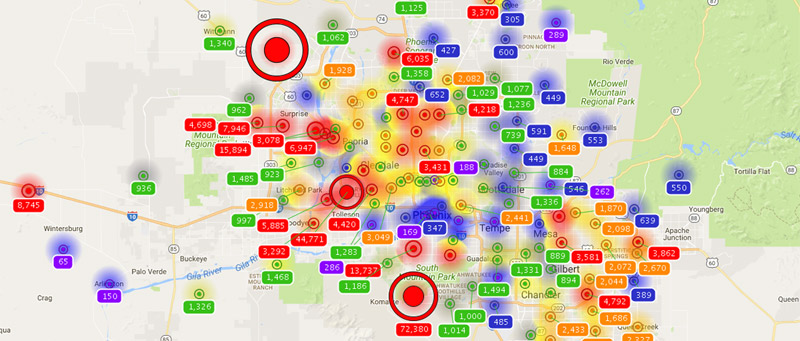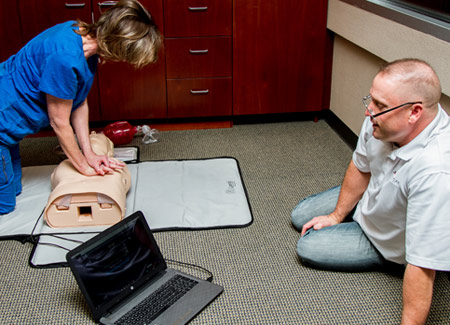A world responsible, accountable and engaged in health equity.
Dedicated to helping you understand what quality care should look like and striving to make it accessible for everyone.
RightCare’s South Phoenix Health Equity Program
 Cardiovascular deaths account for 1 in 3 U.S. deaths. In 2017, JAMA Cardiology reports initiatives to facilitate bystander defibrillation result in increased community lifesavers. Within minority populations, disparities are influenced by access to care, knowledge base, lack of insurance and access to a primary doctor. Cardiovascular death prevention begins with tailored grassroots education. Prevention is critical, but the best way to decrease neurological deficits is a trained population empowered to act immediately. Minorities nationally, and in Arizona, face disproportionate unmet heart health needs. The Arizona Department of Health Services study, “The Burden of Cardiovascular Disease in Arizona,” states 55.8% of Hispanics and 64% of African-Americans die prematurely of cardiovascular related issues compared to 37% of Whites. Hispanic females have the highest mortality rates among ethnicity and genders.
Cardiovascular deaths account for 1 in 3 U.S. deaths. In 2017, JAMA Cardiology reports initiatives to facilitate bystander defibrillation result in increased community lifesavers. Within minority populations, disparities are influenced by access to care, knowledge base, lack of insurance and access to a primary doctor. Cardiovascular death prevention begins with tailored grassroots education. Prevention is critical, but the best way to decrease neurological deficits is a trained population empowered to act immediately. Minorities nationally, and in Arizona, face disproportionate unmet heart health needs. The Arizona Department of Health Services study, “The Burden of Cardiovascular Disease in Arizona,” states 55.8% of Hispanics and 64% of African-Americans die prematurely of cardiovascular related issues compared to 37% of Whites. Hispanic females have the highest mortality rates among ethnicity and genders.
RightCare’s target population is Maricopa County zip codes 85040, 85041 and 85042, within which 62% of residents are Hispanic, 17% African-American and 15% Caucasian. St. Joseph’s Hospital and Medical Center reports cardiovascular disease is the second leading cause of death in its service area. Maricopa County adults age 75+ have the highest rate of cardiovascular disease-related hospital visits. Furthermore, African-American’s have the highest rate of emergency department visits and, in St. Joseph’s Hospital and Medical Center’s primary service area, one in five lacks health insurance (Hispanics and American Indians are the least likely to have insurance). According to the Community Needs Index, the CNI score for 85040 is 5 and it is defined as a high-risk service area. The Community Needs Index score for 85041 is 4.4, and for 85042 it is 4.2. During National Minority Health Month 2017, disparities in underrepresented populations suffering out-of-hospital cardiac arrest were revealed. Data shows residents of predominantly Hispanic and African-American communities were 2-3 times more likely to suffer out-of-hospital cardiac arrest, but were 30-50% less likely to receive bystander resuscitation. Disparities also exist in AEDs per zip code in the Valley of the Sun metropolitan area. Paradise Valley enjoys a ratio of one AED per 753 residents. This compared to a Tempe zip code of one per 148 and South Phoenix 85041 one per 14,306. This highlights an up to 80% greater likelihood of access to AED/resuscitation based on where you live. This is not acceptable.
View RightCare’s Interactive AED Heat Map showing how many people each AED serves in each zip code.
COLLABORATION GOALS:
RightCare and our collaborative partners will redefine the delivery system and focus on pre-first responder medical care. Nationally, 90% of cardiac arrest victims die. The most critical factor in survival is the time of the arrest vs. when compressions begin. Immediate action by layperson rescuers influence outcomes more than first responders, the ER, cath labs and hospital care combined. Our principal activities are to recruit and engage community members and cross-sector entities in improving public health related to cardiac arrest. Through evidence-based best practice training, the partnership will empower South Phoenix residents to perform Immediate Resuscitation and bystander-delivered defibrillation during the critical 0-6 minutes between cardiac arrest and the arrival of first responders. We will strategically place 200 – 250 automated external defibrillators (AEDs) in businesses and gathering spots, provide training and protocols, and create on-site heart teams. RightCare anticipates training a minimum of 2000 community members. The partnership will increase people’s chances of not only surviving cardiac arrest, but surviving without neurological deficit. RightCare’s motto is “Save the Brain.” Medical advances can dramatically improve outcomes related to the heart and lungs. However, once brain damage occurs, it is permanent. By empowering laypersons to begin Immediate Resuscitation and utilize AEDs when available, the cost of care after cardiac arrest significantly decreases. Not only does the victim arrive in the emergency department in an improved state, the likelihood of long-term care is dramatically diminished. This enhanced clinical-community continuum of care in underserved communities will improve health outcomes and reduce care costs.
COLLABORATIVE PARTNER ONE:

First Pentecostal Church has served its community for 70 years. Pastor Eddings has been at the helm for 40 years, succeeding his father. The Church has demonstrated conviction for the good of all people and has garnered community trust and respect. RightCare will work with the church’s Outreach Team, which links government agencies and organizations to augment, assist, assess and implement programs and resources. The Team will help the collaboration identify community resources to bring layperson-enacted resuscitation and/or defibrillation to the places people work, pray and play. These cross-sector affiliations will engage the community; build community capacity; and influence access to care, social justice and transportation.
COLLABORATIVE PARTNER TWO:

The Morrison Institute for Public Policy, Arizona State University provides a nonpartisan research platform which enables it to disseminate public policy information to citizens and policy makers about health equity issues in Arizona. The Morrison Institute will work with RightCare and First Pentecostal Church to define health equity metrics, analyze data and write and disseminate findings to key stakeholders and the public. The Institute can accomplish these tasks through evaluating RightCare’s training’s and providing and analyzing census track data of the populations living in the areas RightCare serves. The Morrison Institute can also conduct key informant interviews and lead focus groups with first responders and healthcare staff. Fluidity, transparency and a continuum of care are top priorities with our collaboration. Cardiac arrest affects all people and knows no boundaries. Each partner will leverage relationships to engage and inspire various sectors of the community. Through our initiative, we believe we can begin defragmenting sectors of the community to rally around a common good of saving lives. RightCare will provide cardiac arrest expertise, training and AED placement. First Pentecostal Church will reach into the community to promote opportunities and the Institute will help by providing data analysis, reporting support and dissemination of findings. The partnership will be unified, intentional and strategic with all partner expertise woven throughout the initiative. Our team will also work with a behavioral health professional, rooted in South Phoenix, to integrate a holistic bio/psycho/social survey. The survey will be tied to CVD prevention and findings will help promote a continuity in care.
ABOUT RIGHTCARE:

RightCare Immediate Resuscitation Training with Steve Wagner
The RightCare Foundation defines best practice pre-first responder access to lifesaving care. Our goal is to improve health outcomes. Our evidence based programs and advocacy support our mission to save lives and honor wishes. We advocate for health equity and policy regarding access to resuscitation and honored end-of-life wishes. Our staff brings 160+ years of combined first responder expertise to our work. We have responded to thousands of cardiac arrests, understand the EMS system and have identified barriers that impact survival. We are the exclusive provider of layperson resuscitation training utilizing best practice resuscitation mannequin technology. Critical metrics including compression rate, depth, hand placement, and recoil, are measured. Our experiential data proves that proficiency increases by 60-85% pre-and post-training. Numerous clinical data supports this work.
Want to help?
Our life saving programs could not exist without the generous support from people like you!
Your donation brings impactful training, equipment and policy changes to your community!
